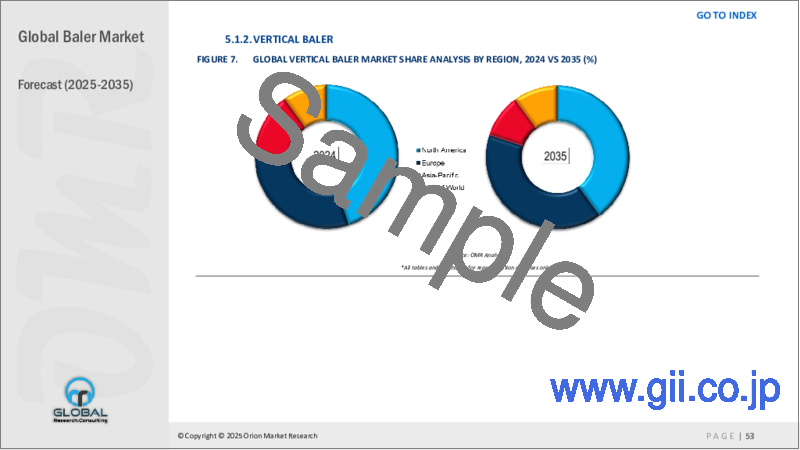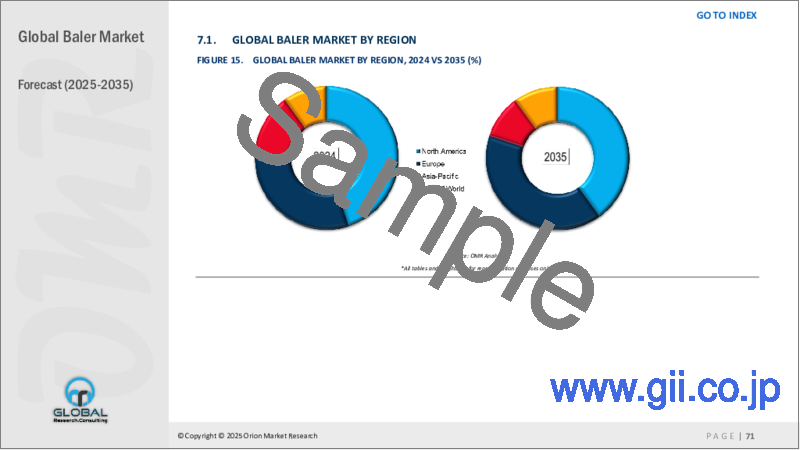|
|
市場調査レポート
商品コード
1518757
ベーラー(圧縮梱包機)の世界市場:2024-2031年Global Baler Market 2024-2031 |
||||||
カスタマイズ可能
|
|||||||
| ベーラー(圧縮梱包機)の世界市場:2024-2031年 |
|
出版日: 2024年06月22日
発行: Orion Market Research
ページ情報: 英文 145 Pages
納期: 2~3営業日
|
全表示
- 概要
- 図表
- 目次
ベーラー(圧縮梱包機)市場は予測期間(2024-2031年)にCAGR 8.5%で成長すると予測されます。市場成長の原動力は、生産工程で発生する廃棄物を圧縮しリサイクルするために、製造業や産業工程で幅広く使用されていることです。また、農業や小売セクターの成長も市場を牽引しています。市場成長を支える主な要因は、ベーラー市場への投資を強化するために、モノのインターネット(IoT)を統合した小型でコンパクトなベーラーへの需要が増加していることです。
市場力学
製造・産業活動の増加
ベーラーは、様々な産業において段ボールや紙ゴミを管理するための費用対効果が高く効率的なソリューションです。ベーラーを生産ラインに組み込むことで、廃棄物保管の必要性と廃棄コストを削減することができます。また、衣料品業界では、生地の切れ端や裁ち落としを圧縮して保管スペースを減らし、リサイクルを容易にするために使用されています。ベーラーではプラスチック廃棄物も処理できるため、より効率的な処理とリサイクルが可能になります。また、金属加工や電子機器製造のような特定の業界で、金属くずやワイヤー切断くずなどの製品別を管理するために使用することもできます。バイオマスベーラーなどの特殊ベーラーは、バイオ燃料製造や発電用に材料を圧縮することができます。産業界が持続可能な慣行と効率的な廃棄物管理に重点を置くにつれ、ニッチな製造アプリケーションにおけるベーラーの役割は拡大すると思われます。ベーラーは、特定の種類の産業廃棄物を処理するためのコスト効率の良い効率的な方法を提供し、廃棄物の流れを管理し、持続可能な慣行を促進するための貴重なツールとなります。
リサイクル活動の増加
世界的に、リサイクル活動の増加がベーラー市場を牽引しています。ベーラーは、バラバラのリサイクル品をコンパクトで高密度のベールに圧縮し、リサイクルをより効率的でコスト効率の高いものにします。ベーラーはまた、廃棄物を埋立地から転換し、より持続可能な廃棄物管理アプローチに貢献することで、企業が規制に準拠するのに役立ちます。マテリアルリサイクル施設(MRF)の増加により、紙、プラスチック、金属缶のようなリサイクル可能な材料を大量に扱うことができるベーラーへの需要がさらに高まっています。水平ベーラーとオートタイベーラーはMRFにとって不可欠であり、大量に処理し、均一なベールを作ることができます。ベーラーはまた、産業廃棄物後のプラスチック廃棄物用のプラスチックフィルムベーラーや、リサイクルや再利用のために繊維くずを圧縮するテキスタイルベーラーなど、多様な材料に対応する汎用性があります。リサイクルの状況が進化するにつれ、ベーラーはより持続可能な未来のために重要なツールであり続けると思われます。
市場セグメンテーション
- タイプに基づいて、市場は水平ベーラー、垂直ベーラー、ラウンドベーラー、スクエアベーラー、特殊ベーラーに分割されます。
- エンドユーザーに基づいて、市場は農業、リサイクル・廃棄物管理、小売にセグメント化されています。
ラウンドベーラーが最大セグメントとして台頭する見込み
ラウンドベーラーセグメントは、使い勝手が良く、効率的で、天候に左右されないため、小規模農場や経験の浅いオペレーターにとって理想的であり、市場の最大シェアを占めると予想されます。連続した円筒形の形状は、スクエアベールよりも効果的に水を吸収するため、腐敗の心配なく屋外保管が可能です。ラウンドベールはまた、梱包がきつく、無駄な角が少ないため、保管スペースが少なくて済み、スペースが限られた農場に適しています。
かなりの市場シェアを占める農業セグメント
ベーラーは、機械化された農業、特に大規模な農地において不可欠なものです。農作物の残渣を効率的に集めて圧縮し、保管、輸送、家畜飼料用のベールにすることで、時間と労力を節約することができます。ベーラーは、干し草、わら、サイレージ、および特定のバイオマス材料を含む様々な作物を扱うことができます。ベーラーは作物の種類を問わず汎用性があるため、多様な農業経営にとって重要な投資となります。ベーラーは、一般的にベーラー材料のより少ないボリュームを生成するように、小売やリサイクルでは限られたアプリケーションを持っています。しかし、農場にとっては、保管面積が小さく、バラ干しに比べて腐敗が少ないなど、経済的な利点があります。ベーラーへの需要は、近代農業の規模と多様なニーズによって牽引されており、世界のベーラー市場において農業が支配的なセグメントであることを確固たるものにしています。
地域別展望
世界のベーラー市場は、北米(米国、カナダ)、欧州(英国、イタリア、スペイン、ドイツ、フランス、その他欧州地域)、アジア太平洋地域(インド、中国、日本、韓国、その他アジア太平洋地域)、世界のその他の地域(中東とアフリカ、ラテンアメリカ)を含む地域に基づいてさらにセグメント化されます。
ベーラー市場に投資するアジア太平洋諸国
- 広大な農地面積とインドにおける農業プロセスの機械化の進展が、この地域市場におけるベーラー需要の増加要因となっています。
- 農業における機械使用を促進するために中国政府によって実施されたイニシアチブは、ベーラー需要を牽引しています。
北米が主要市場シェアを占める
全地域の中で北米が大きなシェアを占めているが、これは広大な農地、多様な作物、政府の支援、先進技術、強固なインフラに起因しています。特に米国とカナダの広大な農地では、農家が作物残渣を効率的に集めて圧縮し、保管、輸送、家畜飼料用のベールにすることを可能にするベーラーなどの大型農業機器が必要とされます。ベーラーの恩恵を受けるトウモロコシ、小麦、大豆、アルファルファなどの多様な作物は、市場の需要を煽っています。北米では政府の政策により農家への資金援助が頻繁に行われており、農業機械への投資がより身近なものとなっています。John DeereやVermeer Corporationのような大手メーカーを擁する定評ある農業機械業界は、常に革新的で先進的なベーラー技術を開発しています。北米内の広範なインフラと流通ネットワークは、ベーラーへの効率的な配送とサポートを保証し、農家がベーラーに投資する可能性を高めています。
目次
第1章 レポート概要
- 業界の現状分析と成長ポテンシャルの展望
- 調査方法とツール
- 市場内訳
- セグメント別
- 地域別
第2章 市場概要と洞察
- 調査範囲
- アナリストの洞察と現在の市場動向
- 主要市場動向
- 推奨事項
- 結論
第3章 競合情勢
- 主要企業分析
- AGCO Corporation
- 概要
- 財務分析
- SWOT分析
- 最近の動向
- CNH Industrial America LLC.
- 会社概要
- 財務分析
- SWOT分析
- 最近の動向
- Mahindra & Mahindra Limited
- 概要
- 財務分析
- SWOT分析
- 最近の動向
- 主要戦略分析
第4章 市場セグメンテーション
- ベーラーの世界市場:タイプ別
- 水平ベーラー
- 垂直ベーラー
- ラウンドベーラー
- スクエアベーラー
- 特殊ベーラー
- ベーラーの世界市場:アプリケーション別
- 農業
- リサイクル・廃棄物管理
- 小売
第5章 地域分析
- 北米
- 米国
- カナダ
- 欧州
- 英国
- ドイツ
- イタリア
- スペイン
- フランス
- その他欧州
- アジア太平洋
- 中国
- インド
- 日本
- 韓国
- その他アジア太平洋地域
- 世界のその他の地域
- ラテンアメリカ
- 中東・アフリカ
第6章 企業プロファイル
- Abbriata S.R.L
- CLASS KGaA mbH Carlos Mainero & CO SAICFI
- Deere & Company
- Harris Equipment
- IHI Corporation
- International Baler Corporation
- John Deere
- Kubota Corporation
- Kuhn Group
- Lovol
- Massey Ferguson
- Maschinenfabrik Bernard KRONE GmbH & Co. KG
- McHale
- New Holland Agriculture
- Orwak AB
- Pioneer Group
- Vermeer Corporation
LIST OF TABLES
- 1. Global Baler Market Research And Analysis By Type, 2023-2031 ($ Million)
- 2. Global Horizontal Baler Market Research And Analysis By Region, 2023-2031 ($ Million)
- 3. Global Vertical Baler Market Research And Analysis By Region, 2023-2031 ($ Million)
- 4. Global Round Baler Market Research And Analysis By Region, 2023-2031 ($ Million)
- 5. Global Square Baler Market Research And Analysis By Region, 2023-2031 ($ Million)
- 6. Global Specialty Baler Market Research And Analysis By Region, 2023-2031 ($ Million)
- 7. Global Baler Market Research And Analysis By Application, 2023-2031 ($ Million)
- 8. Global Baler For Agriculture Market Research And Analysis By Region, 2023-2031 ($ Million)
- 9. Global Baler For Recycling And Waste Management Market Research And Analysis By Region, 2023-2031 ($ Million)
- 10. Global Baler For Retail Market Research And Analysis By Region, 2023-2031 ($ Million)
- 11. Global Baler Market Research And Analysis By Region, 2023-2031 ($ Million)
- 12. North American Baler Market Research And Analysis By Country, 2023-2031 ($ Million)
- 13. North American Baler Market Research And Analysis By Type, 2023-2031 ($ Million)
- 14. North American Baler Market Research And Analysis By Application, 2023-2031 ($ Million)
- 15. European Baler Market Research And Analysis By Country, 2023-2031 ($ Million)
- 16. European Baler Market Research And Analysis By Type, 2023-2031 ($ Million)
- 17. European Baler Market Research And Analysis By Application, 2023-2031 ($ Million)
- 18. Asia-Pacific Baler Market Research And Analysis By Country, 2023-2031 ($ Million)
- 19. Asia-Pacific Baler Market Research And Analysis By Type, 2023-2031 ($ Million)
- 20. Asia-Pacific Baler Market Research And Analysis By Application, 2023-2031 ($ Million)
- 21. Rest Of The World Baler Market Research And Analysis By Region, 2023-2031 ($ Million)
- 22. Rest Of The World Baler Market Research And Analysis By Type, 2023-2031 ($ Million)
- 23. Rest Of The World Baler Market Research And Analysis By Application, 2023-2031 ($ Million)
LIST OF FIGURES
- 1. Global Baler Market Share By Type, 2023 Vs 2031 (%)
- 2. Global Horizontal Baler Market Share By Region, 2023 Vs 2031 (%)
- 3. Global Vertical Baler Market Share By Region, 2023 Vs 2031 (%)
- 4. Global Round Baler Market Share By Region, 2023 Vs 2031 (%)
- 5. Global Square Baler Market Share By Region, 2023 Vs 2031 (%)
- 6. Global Specialty Baler Market Share By Region, 2023 Vs 2031 (%)
- 7. Global Baler Market Share By Application, 2023 Vs 2031 (%)
- 8. Global Baler For Agriculture Market Share By Region, 2023 Vs 2031 (%)
- 9. Global Baler For Recycling And Waste Management Market Share By Region, 2023 Vs 2031 (%)
- 10. Global Baler For Retail Market Share By Region, 2023 Vs 2031 (%)
- 11. Global Baler Market Share By Region, 2023 Vs 2031 (%)
- 12. US Baler Market Size, 2023-2031 ($ Million)
- 13. Canada Baler Market Size, 2023-2031 ($ Million)
- 14. UK Baler Market Size, 2023-2031 ($ Million)
- 15. France Baler Market Size, 2023-2031 ($ Million)
- 16. Germany Baler Market Size, 2023-2031 ($ Million)
- 17. Italy Baler Market Size, 2023-2031 ($ Million)
- 18. Spain Baler Market Size, 2023-2031 ($ Million)
- 19. Rest Of Europe Baler Market Size, 2023-2031 ($ Million)
- 20. India Baler Market Size, 2023-2031 ($ Million)
- 21. China Baler Market Size, 2023-2031 ($ Million)
- 22. Japan Baler Market Size, 2023-2031 ($ Million)
- 23. South Korea Baler Market Size, 2023-2031 ($ Million)
- 24. Rest Of Asia-Pacific Baler Market Size, 2023-2031 ($ Million)
- 25. Latin America Baler Market Size, 2023-2031 ($ Million)
- 26. Middle East And Africa Baler Market Size, 2023-2031 ($ Million)
Baler Market Size, Share & Trends Analysis Report by Type (Horizontal Baler, Vertical Baler, Round Baler, Square Baler, and Specialty Baler), and by Application (Agriculture, Recycling and Waste Management, and Retail), Forecast Period (2024-2031)
Baler market is anticipated to grow at a CAGR of 8.5% during the forecast period (2024-2031). The market growth is driven by extensive use in manufacturing and industrial processes for compacting and recycling waste materials generated during production. The growing agricultural and retail sectors also drive the market. A major factor supporting the market growth is the increasing demand for small and compact balers integrating the Internet of Things (IoT) to bolster investments in the baler market.
Market Dynamics
Increasing Manufacturing and Industrial Activities
Balers are a cost-effective and efficient solution for managing cardboard and paper waste in various industries. They can be integrated into production lines, reducing waste storage requirements and disposal costs. They are also used in the garment industry for compressing fabric scraps and trimmings, reducing storage space and allowing for easier recycling. Balers can also handle plastic waste, allowing for more efficient handling and recycling opportunities. They can also be used in specific industries like metal processing or electronics manufacturing for managing byproducts, such as metal shavings or wire cuttings. Specialty balers, such as biomass balers, can compact materials for biofuel production or power generation. As industries focus on sustainable practices and efficient waste management, the role of balers in niche manufacturing applications is likely to expand. Balers offer a cost-effective and efficient way to handle specific types of industrial waste, making them a valuable tool in managing waste streams and promoting sustainable practices.
Increasing recycling activities
Globally, the increase in recycling activities is driving the baler market forward. Balers compress loose recyclables into compact, dense bales, making recycling more efficient and cost-effective. Baling also improves material quality by minimizing contamination risks during collection and transportation. Balers also help businesses comply with regulations by diverting waste from landfills and contributing to a more sustainable waste management approach. The growing number of Material Recovery Facilities (MRFs) further fuels the demand for balers, which can handle large volumes of recyclable materials like paper, plastic, and metal cans. Horizontal and auto-tie balers are essential for MRFs, handling high volumes and creating uniform bales. Balers are also versatile for diverse materials, such as plastic film balers for post-industrial plastic waste and textile balers for compressing fabric scraps for recycling or repurposing. As the recycling landscape evolves, balers will continue to be a critical tool for a more sustainable future.
Market Segmentation
- Based on type, the market is segmented into horizontal balers, vertical balers, round balers, square balers, and specialty balers.
- Based on end-users, the market is segmented into agriculture, recycling and waste management, and retail.
Round Baler is Projected to Emerge as the Largest Segment
The round baler segment is expected to hold the largest share of the market as they are user-friendly, efficient, and weatherproof, which makes them ideal for smaller farms and less experienced operators. Their continuous, cylindrical shape sheds water more effectively than square bales, allowing for outdoor storage without spoilage concerns. Round bales also require less storage space due to tighter packing and fewer wasted corners, making them suitable for farms with limited space. For instance, in August 2023, AGCO Corporation launched the Massey Ferguson 1 Series round baler series, designed for efficiency, quality, and operator comfort in dry hay, stover, and residue applications. The proven technology and rugged dependability of the baler will be showcased at the Farm Progress Show in Decatur, Illinois. Round balers are versatile for various crops, making them a valuable investment for farms cultivating diverse crops.
Agriculture Segment to Hold a Considerable Market Share
Balers are essential in mechanized agriculture, particularly in large farmlands. They efficiently collect and compress crop residues into bales for storage, transportation, and animal feed, saving time and labor. Balers can handle various crops, including hay, straw, silage, and certain biomass materials. They are versatile across crops, making them a crucial investment for diverse agricultural operations. Balers have limited applications in retail and recycling, as they typically generate smaller volumes of baler materials. However, they offer economic advantages for farms, such as a smaller storage footprint and less spoilage compared to loose hay. The demand for balers is driven by the scale and diverse needs of modern agriculture, solidifying agriculture's position as the dominant segment in the global baler market.
Regional Outlook
The global baler market is further segmented based on geography including North America (the US, and Canada), Europe (UK, Italy, Spain, Germany, France, and the Rest of Europe), Asia-Pacific (India, China, Japan, South Korea, and Rest of Asia-Pacific), and the Rest of the World (the Middle East & Africa, and Latin America).
Asia-Pacific countries to invest in baler market
- The large agricultural land area and growing mechanization of agricultural processes in India are the factors responsible for the rise in demand for balers in the regional market.
- Initiatives undertaken by the Chinese government to promote machinery usage in agriculture are driving the demand for balers.
North America Holds Major Market Share
Among all the regions, North America holds a significant share which is attributed to its vast farmlands, diverse crops, government support, advanced technology, and robust infrastructure. The vast agricultural regions in the US and Canada, particularly in the US and Canada, necessitate large-scale farming equipment, such as balers, which enable farmers to efficiently collect and compress crop residues into bales for storage, transportation, and animal feed. The diverse crops of corn, wheat, soybeans, and alfalfa, which benefit from baling, fuel market demand. Government policies in North America often provide financial aid to farmers, making investments in agricultural equipment more accessible. The well-established agricultural machinery industry, with leading manufacturers like John Deere and Vermeer Corporation, constantly innovates and develops advanced baler technologies. The extensive infrastructure and distribution networks within North America ensure efficient delivery and support for balers, making farmers more likely to invest in baling solutions.
Market Players Outlook
The major companies serving the global baler market include AGCO Corporation, CNH Industrial America LLC., Mahindra & Mahindra Ltd., John Deere, and New Holland Agriculture, among others. The market players are increasingly focusing on business expansion and product development by applying strategies such as collaborations, mergers, and acquisitions to stay competitive in the market. For instance, in August 2023, John Deere launched new connected 1 Series round balers. John Deere's new 1 Series round balers are built with new technology to document bale moisture and weight while in the field and are designed to help farmers increase efficiency and return on investment.
Table of Contents
1. Report Summary
- Current Industry Analysis and Growth Potential Outlook
- 1.1. Research Methods and Tools
- 1.2. Market Breakdown
- 1.2.1. By Segments
- 1.2.2. By Region
2. Market Overview and Insights
- 2.1. Scope of the Report
- 2.2. Analyst Insight & Current Market Trends
- 2.2.1. Key Market Trends
- 2.2.2. Recommendations
- 2.2.3. Conclusion
3. Competitive Landscape
- 3.1. Key Company Analysis
- 3.2. AGCO Corporation
- 3.2.1. Overview
- 3.2.2. Financial Analysis
- 3.2.3. SWOT Analysis
- 3.2.4. Recent Developments
- 3.3. CNH Industrial America LLC.
- 3.3.1. Overview
- 3.3.2. Financial Analysis
- 3.3.3. SWOT Analysis
- 3.3.4. Recent Developments
- 3.4. Mahindra & Mahindra Limited
- 3.4.1. Overview
- 3.4.2. Financial Analysis
- 3.4.3. SWOT Analysis
- 3.4.4. Recent Developments
- 3.5. Key Strategy Analysis
4. Market Segmentation
- 4.1. Global Baler Market by Type
- 4.1.1. Horizontal Baler
- 4.1.2. Vertical Baler
- 4.1.3. Round Baler
- 4.1.4. Square Baler
- 4.1.5. Specialty Baler
- 4.2. Global Baler Market by Application
- 4.2.1. Agricultural
- 4.2.2. Recycling and Waste Management
- 4.2.3. Retail
5. Regional Analysis
- 5.1. North America
- 5.1.1. United States
- 5.1.2. Canada
- 5.2. Europe
- 5.2.1. UK
- 5.2.2. Germany
- 5.2.3. Italy
- 5.2.4. Spain
- 5.2.5. France
- 5.2.6. Rest of Europe
- 5.3. Asia-Pacific
- 5.3.1. China
- 5.3.2. India
- 5.3.3. Japan
- 5.3.4. South Korea
- 5.3.5. Rest of Asia-Pacific
- 5.4. Rest of the World
- 5.4.1. Latin America
- 5.4.2. Middle East & Africa
6. Company Profiles
- 6.1. Abbriata S.R.L
- 6.2. CLASS KGaA mbH Carlos Mainero & CO SAICFI
- 6.3. Deere & Company
- 6.4. Harris Equipment
- 6.5. IHI Corporation
- 6.6. International Baler Corporation
- 6.7. John Deere
- 6.8. Kubota Corporation
- 6.9. Kuhn Group
- 6.10. Lovol
- 6.11. Massey Ferguson
- 6.12. Maschinenfabrik Bernard KRONE GmbH & Co. KG
- 6.13. McHale
- 6.14. New Holland Agriculture
- 6.15. Orwak AB
- 6.16. Pioneer Group
- 6.17. Vermeer Corporation






